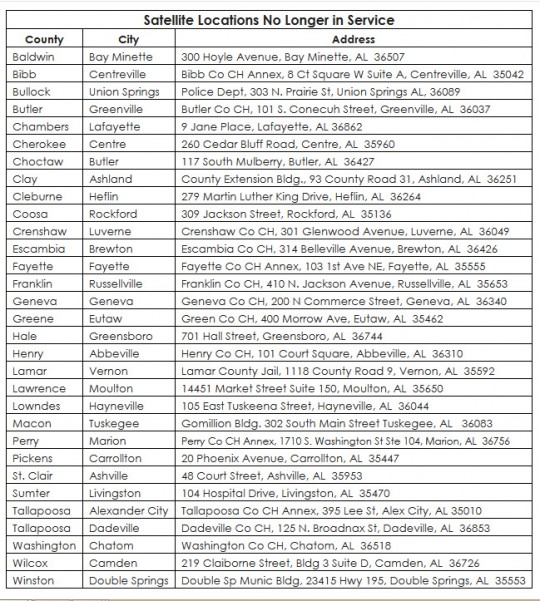New Florida Laws Begin
October 1, 2015
It is now illegal to post sexually explicit material without the knowledge of people identified in the images, and criminal penalties increased to try to help curb sex trafficking, as 27 new Florida laws hit the books Thursday.
The bulk of the 232 bills signed by Gov. Rick Scott out of the 2015 legislative session went into effect July 1.
 But the new laws taking effect will, in part, let municipalities expand where golf carts can be driven, further spell out the requirements when judges issue “no contact” orders and make it illegal to place tracking devices on other people’s property without their consent.
But the new laws taking effect will, in part, let municipalities expand where golf carts can be driven, further spell out the requirements when judges issue “no contact” orders and make it illegal to place tracking devices on other people’s property without their consent.
Here are some of the laws that will take effect Thursday:
“REVENGE PORN”
— SB 538 makes it a first-degree misdemeanor to “sexually cyberharass” by posting sexually explicit images of other people without their consent.
The measure, addressing an issue that has become known as “revenge porn,” is not as strong as sponsors initially sought, with it requiring the uploaded information to include “personal identification information,” such as the name or other information, of the person depicted.
Senate sponsor David Simmons, R-Altamonte Springs, said during the session that the final product creates a “foothold” into the issue. “We’re doing the best we can, but we’re not doing all we can,” Simmons said.
DOMESTIC VIOLENCE
—- SB 342 makes clear that when a judge imposes a “no contact” condition as part of a person’s pretrial release, the order is effective immediately and enforceable for the duration of pretrial release.
The measure, which could help protect domestic-violence victims, also spells out that other than through an attorney, the “no contact” prohibition means contact cannot take place in person, through a telephone, electronically or through a third person.
HUMAN TRAFFICKING
— HB 465 increases criminal penalties for people who solicit others to commit prostitution. The penalty will go from a second-degree misdemeanor to a first degree misdemeanor on a first offense. A second offense will increase from a first-degree misdemeanor to a third-degree felony.
People convicted of solicitation will also have to perform 100 hours of community service and complete an educational program about the negative effects of prostitution and human trafficking. A judge can also impound a person’s vehicle if the solicitation sentence includes at least 60 days in jail.
The state during the past few years has tried to crack down on human trafficking, which often involves victims being forced to work as prostitutes.
— HB 467 and HB 469 create public-records exemptions that protect the identity of human-trafficking victims and shield the location of safe houses for victims of sexual exploitation.
HIGHWAY SAFETY
— HB 7055 includes a number f transportation-related changes — known as a legislative “train.”
In part, the measure will allow golf carts to be driven on two-lane county roads if approved by municipalities; require an 18-inch square, red flag on all loads that jut out more than four feet form the back of vehicles; increase the fine from $100 to $500 for a violation of unlawfully displaying vehicles for sale, hire, or rental; and let certified emergency-medical technicians with proper training administer emergency allergy treatment.
Among other things, the law also will allow the Department of Highway Safety and Motor Vehicles to pay up to $5,000 of the costs of funerals and burials for law-enforcement officers killed in the line of duty.
LAW ENFORCEMENT
— HB 197 makes it a second-degree misdemeanor for a person to install a tracking device or tracking application on another person’s property without the other person’s consent. The measure doesn’t apply to law-enforcement officers during investigations, the parents or guardians of minors or caregivers of certain elderly or disabled adults.
— HB 201 requires the Florida Department of Law Enforcement to establish an online training program for law officers about diabetic emergencies.
— SB 1010 makes it illegal to impersonate a firefighter or a fire or arson investigator.
HEALTH CARE
—HB 889 changes the health-care surrogate law so people can designate health-care surrogates to act on their behalf while the people are still competent and able to make decisions. However, if still deemed competent, the individuals’ decisions top any contrary decisions of the surrogates.
The bill also will allow parents or legal guardians of minors to name surrogates to act for the minors if the parents or legal guardians cannot be timely contacted to make medical decisions, which includes dental examination and treatment.
GOVERNMENT ACCOUNTABLITY
— HB 115 requires judge to order public officials to make restitution and perform 250 hours of community service when found misusing their positions.
Senate Could Drop Confederate Flag From Seal
October 1, 2015
State senators are scheduled next week to begin considering whether to keep the Confederate flag on the Senate’s official seal, another sign of a growing national tide against icons of the South’s rebellion in the 1860s.
The Senate Rules Committee will meet Oct. 8 to begin re-examining the current emblem of the chamber. Under Senate rules, the seal includes “a fan of the five flags which have flown over Florida” — those of the United States, Confederate States of America, France, Great Britain and Spain.
 But there has been a growing backlash against Confederate symbols since June, when a man with white supremacist views opened fire at an African-American church in Charleston, S.C., killing nine people. Since then, Southern states including Florida have wrestled with how to reconcile past commemorations of “the lost cause” with shifting feelings about race and the meaning of the Civil War.
But there has been a growing backlash against Confederate symbols since June, when a man with white supremacist views opened fire at an African-American church in Charleston, S.C., killing nine people. Since then, Southern states including Florida have wrestled with how to reconcile past commemorations of “the lost cause” with shifting feelings about race and the meaning of the Civil War.
While many Southerners view displays of the Confederate banner as recognition of their ancestors’ military service and sacrifice, African-Americans and others see flying the flag as an endorsement of the brutal, slave-driven economy that was a central issue in the war.
Senate President Andy Gardiner, R-Orlando, and Senate Minority Leader Arthenia Joyner, D-Tampa, requested in June that the committee consider whether the seal should be changed. In a memo, Gardiner did not specifically point to the Confederate flag, but wrote about how views on symbols can transform over time.
“The current Senate seal and coat of arms were first adopted in rule in 1973,” Gardiner wrote. “Florida has certainly changed a great deal since the early seventies. Just as our state seal has been revised over time, I believe a periodic review of our legislative insignia would be beneficial.”
In a separate letter to Rules Chairman David Simmons, Joyner called explicitly for “the removal of the Confederate flag from the official Senate seal.”
Gardiner asked Simmons, R-Altamonte Springs, to have a recommendation ready when the next regular legislative session begins in January. Any change to the Senate seal would require a two-thirds vote of the Senate.
Other legislative efforts dealing with the flag are also underway. A pair of bills (SB 154 and HB 243) — sponsored by Sen. Geraldine Thompson, D-Orlando, and Rep. Darryl Rouson, D-St. Petersburg — would seek to ban government buildings or properties from displaying any flag used by the Confederacy during its 1860 to 1865 rebellion.
Legislative leaders have not yet scheduled either bill for a committee hearing.
Lawmakers could also consider legislation to replace a statue of Confederate Gen. Edmund Kirby Smith, whose likeness is one of two sculptures that represent the state in the National Statuary Hall Collection at the U.S. Capitol Visitor Center in Washington, D.C.
And the argument about how to commemorate Confederate military service has continued elsewhere. The Sons of Confederate Veterans has pushed unsuccessfully to get soldiers who fought against the Union admitted to the Florida Veterans’ Hall of Fame.
by Brandon Larrabee, The News Service of Florida
Navy Federal Donates $20,000 To Escambia Schools
October 1, 2015
Students in Escambia County Public Schools will benefit from a donation from Navy Federal Credit Union. The organization presented a check for $20,000 to the Escambia County Public Schools Foundation, and the Foundation will use matching funds from the Consortium of Florida Education Foundations to double the impact of the gift to $40,000.
“We are proud to support the Escambia County Public Schools Foundation,” said Debbie Calder, executive vice president of Navy Federal Credit Union’s Greater Pensacola Operations. “When combined with the matching state funds, we hope this donation will make a noticeable positive impact in the lives of local students.”
The grant from Navy Federal is dedicated to support the Foundation’s annual “Grants for Excellence” initiative, a program that allows teachers to apply for classroom grants up to $2,000 to support Literacy and STEM (Science, Technology, Engineering and Math) education. The contribution from Navy Federal will allow the Foundation to provide $90,000 in grants to local teachers in the 2015-16 school year.
“We are extremely grateful to our generous partners in the community like Navy Federal who value the role of public education in Escambia County,” stated David Deliman, chair of the Foundation’s board of directors. “These grants help teachers provide innovative, hands-on learning experiences to our children to help ensure they are prepared to compete in the workforce upon graduation.”
Checks will be presented to the grant winners at a special ceremony on Thursday, October 22.
Pictured: Debbie Calder, executive vice president of Navy Federal Credit Union’s Greater Pensacola Operations; David Deliman, foundation chairman; Escambia Schools Superintendent Malcolm Thomas; and Thomas Greek, assistant vice president, Learning & Development, Navy Federal. Submitted photo for North Escambia.com, click to enlarge.
Alabama Closes Numerous Driver’s License Offices, Atmore To Remain Open
October 1, 2015
Numerous driver’s license offices across Alabama are now closed — including those in Brewton and Bay Minette, while Atmore will remain open.
An $11 million cut in the new General Fund appropriation to the Alabama Law Enforcement Agency (ALEA) forced the elimination of travel to 31 part-time, non-state owned, satellite locations. Effective Wednesday, the traveling driver license examiners were reallocated to staff district driver license offices full-time.
Alabama issues an average of 1.2 million driver licenses each year. The Driver License Division is severely understaffed and has 103 vacant positions as a result of past budget cuts and attrition. Analyzing transactions performed in each location throughout the state revealed the combined efforts of the 31 part-time satellite locations accounted for less than five percent of all Alabama Driver License transactions performed by ALEA. The busiest of these 31 satellite locations performed less than 2,000 transactions during 2014.
The schedules for ALEA District Driver License Offices are available online at www.alrenewal.com. Additionally, to help citizens who currently utilize these part-time, satellite locations, ALEA has developed an interactive Citizen Services Locator Map that will identify and locate the closest office and the services it provides. Citizens can access the Citizens Services Locator Map by visiting www.alrenewal.com.
Pictured top: The driver’s license office inside the Atmore City Hall will remain open. Pictured below: List of now closed driver’s license offices. NorthEscambia.com photo, click to enlarge.
No Staff Cuts Yet As Citizens Insurance Sheds Policies
October 1, 2015
Efforts to move policies from Citizens Property Insurance into the private market could eventually lead to the state-backed insurer trimming staff.
President and CEO Barry Gilway told Citizens board members Wednesday that if the number of polices drops far below 450,000 — the number projected for the end of 2016 — lower revenue will also necessitate a change in the insurer’s administrative “model.”
 But that won’t be the case when a budget for the coming year is presented in December, he said.
But that won’t be the case when a budget for the coming year is presented in December, he said.
The company, which has been able to amass a financial surplus as Florida has not felt a direct hit from a hurricane in nearly a decade, employs about 1,100 people, and Gilway said that number will hold when the budget is released.
“You won’t see a proposed significant drop in employee count, simply because in the claims areas, as an example, we actually need to add staff to do a more effective job in the water-damage arena,” Gilway said.
When Gilway requested the Office of Insurance Regulation approve a rate hike for Citizens policyholders in August, he pointed to a “disturbing” rise in water-damage claims in South Florida as a key factor in the need for the increase.
However, Gilway said the overall number of Citizens employees shouldn’t grow as the company is able to reduce in other areas through attrition.
“We all know the balance, we have to run an efficient organization,” Gilway said. “But we also have to be in a position that we can scale rapidly in the case of a single event, multiple events, and frankly a change in reinsurance pricing.”
Spokesman Michael Peltier noted after the meeting that while Citizens hasn’t changed its core staff, the company has been able save millions of dollars the past couple of years by reducing about 900 “contingency” positions, which are people hired as freelancers from other companies.
“We’re at this point based upon where we have been in the past 18 months,” Peltier said.
The current low cost for reinsurance — insurance for insurance companies — has been a large driver in allowing private insurance firms to grow and pick up policies from Citizens, including some coastal accounts that present more risk from storms.
Citizens has reduced its number of policies from a high of 1.5 million in 2012, when Gov. Rick Scott pushed to scale back the agency by moving more homeowners into private coverage, to now around 586,000.
Gilway said the company could be in the low-500,000 range by the end of this year, even though reductions through what is known as the private-insurer “takeout” process have seemingly slowed this year.
So far this year, of the 713,336 Citizens policies made available through the process, 141,680 policies have been moved into private hands.
A reason for the overall low turnover is that private insurers typically select the least-risky policies to remove from Citizens. Also, policyholders are allowed to reject takeout offers.
Still, more polices are expected to shift later this year. The Office of Insurance Regulation has approved more than 460,000 polices for separate “takeouts” planned for mid-October and mid-November.
by Jim Turner, The News Service of Florida
Thin Blue Line, Thin Red Line Flags Now Fly In Flomaton
October 1, 2015
The thin blue line and thin red line flags are now flying outside the Flomaton police and fire station on Highway 31. The flags were purchased by a local citizen to show support for police and fire personnel. Photo for NorthEscambia.com, click to enlarge.
Escambia Corrections Department Passes Standards Inspection
October 1, 2015
The Escambia County Corrections Department recently completed the annual Florida Model Jail Standards (FMJS) inspections. Corrections passed both the Jail Standards and Medical Unit inspections, with the inspectors finding no serious violations, according to a county news release.
 On August 24, FMJS Inspectors, Lt. April McQueen and Sgt. David Harvey conducted the annual inspection of Corrections facilities including the Main Jail and Work Release Center. During the Inspection only three minor violations were found. These violations are a result of the loss of the Central Booking and Detention (CBD) facility which was destroyed last year in an explosion.
On August 24, FMJS Inspectors, Lt. April McQueen and Sgt. David Harvey conducted the annual inspection of Corrections facilities including the Main Jail and Work Release Center. During the Inspection only three minor violations were found. These violations are a result of the loss of the Central Booking and Detention (CBD) facility which was destroyed last year in an explosion.
On September 17, FMJS Medical Inspector, Lt. Donna Wainright, R.N, conducted the annual medical inspection of the Escambia County Jail, Escambia County Road Prison and Work Release Center. There were no violations found.
Florida Model Jail Standards are the basic standards for all jails in the state. Escambia’s Corrections Department also holds accreditation from the National Commission on Correctional Health Care (NCCHC) and the Florida Corrections Accreditations Commission (FCAC).
Dads Head To School At Pine Meadow, Lipscomb Elementaries
October 1, 2015
 Pine Meadow and Lipscomb elementary schools took part in “Dads, Take Your Child to School Day” on Wednesday. The day was proclaimed by Gov. Rick Scoot who said that research suggests that when fathers are actively involved in their child’s education, students perform better academically, have few discipline problems and become more responsible adults.
Pine Meadow and Lipscomb elementary schools took part in “Dads, Take Your Child to School Day” on Wednesday. The day was proclaimed by Gov. Rick Scoot who said that research suggests that when fathers are actively involved in their child’s education, students perform better academically, have few discipline problems and become more responsible adults.
Dads and other male role models, such as grandfathers, stepdads and foster dads were also encouraged to take part.
Lipscomb Elementary welcomed dads to campus with “Donuts for Dads”, and at Pine Meadow, dads had the opportunity to follow their children through their school day.
Photos by Kim Stefansson for NorthEscambia.com, click to enlarge.
56 New State Troopers Graduate from FHP Academy
October 1, 2015
There are 56 new troopers in the Florida Highway Patrol, joining 1,800 already patrolling the state’s roadways. The newly graduated troopers went through 28 weeks of intense physical and classroom training covering topics such as human relations, law, firearms, defensive tactics, vehicle operations and first aid. Upon reporting to their duty stations, the new troopers will be placed with a certified Field Training Officer (FTO). Troopers will work in tandem with their respective FTO for up to 12 weeks prior to being released to solo duty. Submitted photo for NorthEscambia.com, click to enlarge.
Deadline Extended To Apply For Restore Act Funds
September 30, 2015
The deadline to apply for RESTORE funds in Escambia County has been extended through Friday.
 Due to a scheduling error, the RESTORE Project Portal closed Tuesday, September 29, at 11:59 p.m. The Portal was reopened when the error was realized, and in order to accommodate anyone who may have been affected by this temporary closure, Escambia County has extended the original deadline. The Portal will remain open until 11:59 p.m. on Friday, October 2.
Due to a scheduling error, the RESTORE Project Portal closed Tuesday, September 29, at 11:59 p.m. The Portal was reopened when the error was realized, and in order to accommodate anyone who may have been affected by this temporary closure, Escambia County has extended the original deadline. The Portal will remain open until 11:59 p.m. on Friday, October 2.
No project proposals will be accepted after the portal’s closing date, and submitted projects must do the following:
- Meet at least one of the eligibility criteria outlined in the federal RESTORE Act (see eligible activities)
- Include a project budget
- Address the evaluation criteria which can be found at www.myescambia.com/restore
The Escambia County RESTORE Advisory Committee will meet Tuesday, October 20, at 4 p.m. in the BCC Chambers, 221 Palafox Place, to discuss the submitted projects and the next step in the process. The public is invited and encouraged to attend.
To submit a project idea today, visit restore.myescambia.com. For more information or general questions about the submission process, upcoming RESTORE meetings or related topics, visit myescambia.com/restore or contact Shelly Marshall, RESTORE coordinator for Escambia County, at (850) 595-3460 or email restore@myescambia.com.








